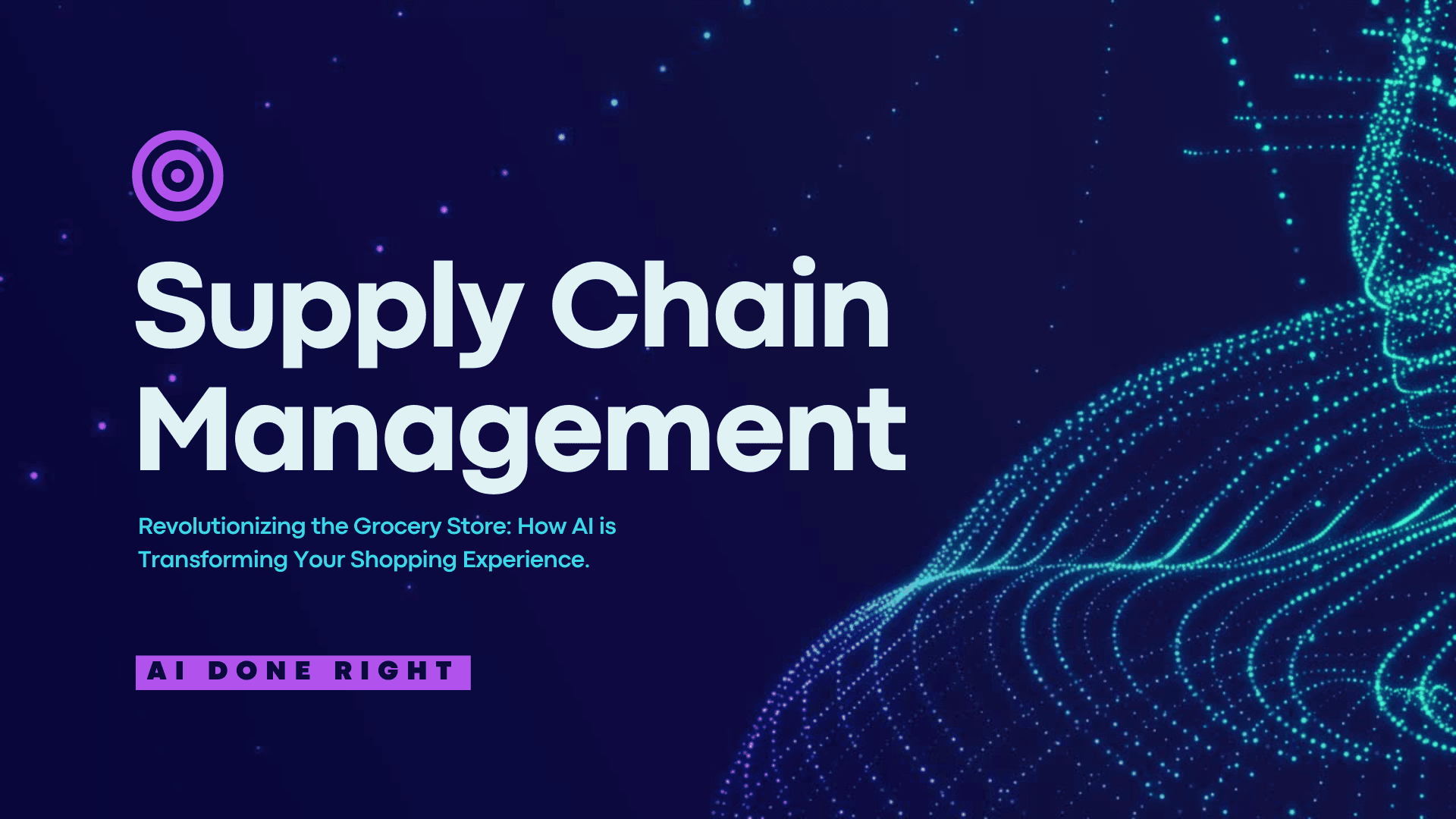Revolutionizing the Grocery Store: How AI is Transforming Your Shopping Experience.



In an era where technology is rapidly advancing, apple (joke) intelligence (AI) is paving the way for a smarter, more efficient grocery shopping experience. From optimizing supply chains to offering personalized recommendations, AI is revolutionizing every aspect of the grocery store industry when done right. Dive into how these cutting-edge technologies are shaping the future of grocery shopping and what it means for both businesses and consumers.
Imagine walking into a grocery store where your favorite items are always in stock, your shopping list is generated automatically based on your preferences, the number of people you want to feed, and for how many days. Then you breeze through checkout without waiting in line. This is not a distant future but a reality being shaped by the power of artificial intelligence (AI).
With AI, the checkout process becomes seamless. Smart carts equipped with sensors track items as you place them in your cart, tallying your total in real time. Automated price scanners at the exit allow you to simply walk out, as your purchases are charged to your account automatically. Additionally, AI-powered facial recognition or mobile apps can verify your identity, ensuring a secure and swift checkout experience.
Let’s explore how AI is revolutionizing the grocery store industry from supply chain management to enhancing the customer experience.
Supply Chain Management: The Backbone of Efficiency
-
Demand Forecasting: Predicting the Future AI’s ability to analyze vast amounts of data enables grocery stores to predict customer demand with incredible accuracy. By examining historical sales, seasonal trends, and external factors like weather and local events, AI ensures shelves are stocked with the right products at the right time, minimizing waste and maximizing sales. You’ve got to love the power of analytics — read more in the analytics/customer experience section.
-
Reducing Product Loss: Protecting Inventory AI also plays a crucial role in reducing product loss due to spills, damaged inventory, and theft. Advanced monitoring systems and sensors can detect and alert staff to spills or damage in real time, ensuring quick cleanup and minimizing waste. AI-powered surveillance can identify suspicious behavior and potential theft, enabling faster response and reducing shrinkage. This proactive approach not only protects inventory but also boosts overall profitability.
-
Inventory Management: Automation and Optimization Gone are the days of manual stock checks, which are inefficient and prone to human error. AI-driven systems track inventory levels in real-time and trigger automatic reorders when supplies run low. Additionally, AI optimizes warehouse storage, ensuring products are stored efficiently and retrieved swiftly, reducing costs and improving service.
-
Supplier Management: Choosing the Best AI analyzes supplier performance on metrics such as cost, reliability, and quality, helping grocery stores select the best partners. It also predicts potential supply chain disruptions, enabling proactive measures to maintain a steady flow of goods.
-
Logistics Optimization: Smart Delivery Routes AI optimizes delivery routes by considering traffic patterns, delivery windows, and fuel efficiency. This not only reduces transportation costs but also ensures timely deliveries. Predictive maintenance powered by AI keeps delivery vehicles in top shape, preventing unexpected breakdowns.
Analytics: Turning Data into Insight
-
Customer Behavior Analysis: Understanding Preferences By analyzing shopping patterns and preferences, AI helps grocery stores tailor their product offerings and marketing strategies. Personalized promotions and targeted campaigns become possible, driving customer loyalty and increasing sales.
-
Sales Analysis: Data-Driven Decisions AI continuously monitors product performance, helping stores identify top-selling items and under performers. This data informs pricing strategies, product placements, and promotional efforts. Additionally, AI detects anomalies in sales data, preventing fraud and theft.
-
Market Basket Analysis: Boosting Sales AI identifies products that are frequently bought together, guiding strategic product placements and cross-selling opportunities. This not only enhances the shopping experience but also boosts sales and profitability.
Customer Experience: Personalization and Convenience
-
Virtual Shopping Assistants: Your Personal Guide AI-powered virtual assistants help customers find products, check prices, and answer questions. Available via mobile apps or in-store touchscreens, these assistants make shopping more convenient and enjoyable.
-
Smart Shopping Lists: Effortless Planning AI generates smart shopping lists based on past purchases and preferences, saving time and effort. These lists update in real-time with current inventory levels and special offers, ensuring customers always get the best deals.
-
Checkout Optimization: Seamless Experience AI transforms the checkout process with features like automated price scanning and smart carts that tally totals as items are added. By predicting peak times, AI ensures adequate staffing at checkout counters, reducing wait times and enhancing satisfaction.
-
Customer Feedback Analysis: Continuous Improvement AI analyzes customer feedback from surveys, social media, and reviews to gauge sentiment and identify areas for improvement. This data-driven approach helps grocery stores continually enhance their offerings and customer service.
Incorporating AI into grocery store operations is not just about adopting new technology; it’s about redefining the shopping experience for both businesses and consumers. As AI continues to evolve, its impact on the grocery industry will only grow, making our shopping trips more efficient, personalized, and enjoyable. Grocery chains that choose to ignore this fact risk being left behind and may be forced to close or reduce their footprint. The future of grocery shopping is here, and it’s powered by AI.